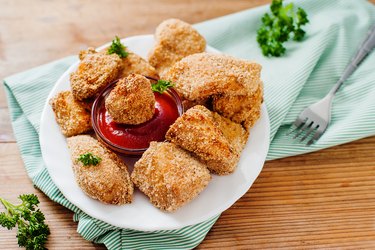
Experts say frying chicken in olive oil is fine, but they don't advocate frying in butter or coconut oil. Extra-virgin olive oil is the safest oil to use for cooking because it produces the least amount of harmful compounds when heated.
Tip
You can pan-fry breaded chicken in olive oil. At least one study has shown that this is one of the safest oils to use for this type of frying.
Video of the Day
Pan Frying With Olive Oil
People tend to view fried foods as dietary indiscretions. However, a January 2012 study published in the British Medical Journal suggests that the unhealthy effects associated with frying may be due to the type of oil used, rather than the frying process itself. The authors found that in Spain, a country where people cook with olive or sunflower oil, eating fried food wasn't linked to heart disease or all-cause mortality.
Video of the Day
When frying, use a healthy vegetable oil, such as olive oil, advises Harvard Health. Avoid frying with butter, lard or palm oil.
Reusing any kind of oil isn't recommended, because when oil is heated, it degrades and forms unhealthy substances called polar compounds. When foods are fried in reheated oil, they absorb these degraded oil products.
While smoke point has been correlated with oil stability and safety when heated, a June 2018 study published in Acta Scientific Nutritional Health found other factors more accurately predict oil performance. After testing common cooking oils, extra virgin olive oil proved to be the safest, because it produced the fewest polar compounds when exposed to heat.
Frying With Coconut Oil
The Harvard T.H. Chan School of Public Health reports that many of the health benefits associated with coconut oil are backed by studies that don't use the type of coconut oil available in supermarkets. Instead, the research is based on a special formula comprised solely of medium-chain triglycerides, which the body rapidly absorbs and utilizes.
An April 2016 study published in Nutrition Reviews evaluated eight clinical trials and 13 observational investigations to determine the effect of coconut oil on heart health. It discovered that, in general, the oil increased total cholesterol and LDL, or bad cholesterol, levels less than butter, but more than unsaturated plant oils. Replacing coconut oil with unsaturated oils would improve cholesterol levels, which would help lower cardiovascular disease risk, the authors concluded.
The American Heart Association issued an advisory to replace saturated fat, such as coconut oil and butter, with unsaturated fat like extra virgin olive oil. According to the author of the advisory, deep frying is fine, as long as you use an unsaturated vegetable oil.
USDA Chicken-Frying Recommendations
Whether you fry pieces of chicken in a skillet or deep fryer, check the internal temperature of the meat, says the USDA. If it's below 165 degrees Fahrenheit, cook it longer.
Read More: How Many Calories Does Frying Add?
The oil temperature for frying chicken is important to ensure thorough cooking. When deep frying, allow the oil to preheat, and take the temperature before starting. Cook chicken pieces at 375 degrees Fahrenheit for 13 to 20 minutes, and cook chicken fingers at 350 degrees Fahrenheit for 6 to 8 minutes.
Frying chicken comes with certain hazards that can be minimized by following a few precautions. The USDA provides the guidelines below:
- To prevent cross contamination from bacteria, wash your hands and clean all surfaces before handling the chicken.
- Frying oil can reach very high temperatures, so keep a fire extinguisher in the kitchen.
- To avoid burns from oil splatters, don't allow water to get into the frying oil. (If you're frying frozen food, remove excess ice before putting it in the oil.)
- Use a slotted spoon or tongs to remove chicken pieces from a skillet. Don't use plastic utensils because they can melt under high temperatures.
- British Medical Journal: "Consumption of Fried Foods and Risk of Coronary Heart Disease: Spanish Cohort of the European Prospective Investigation Into Cancer and Nutrition Study"
- Harvard Health Publishing: "Healthier Oils Make Fried Food Safer"
- Acta Scientific Nutritional Health: "Evaluation of Chemical and Physical Changes in Different Commercial Oils During Heating"
- Harvard T.H. Chan School of Public Health: "Coconut Oil"
- Nutrition Reviews: "Coconut Oil Consumption and Cardiovascular Risk Factors in Humans"
- American Heart Association: Advisory: "Replacing Saturated Fat With Healthier Fat Could Lower Cardiovascular Risks"
- United States Department of Agriculture: "Deep Fat Frying and Food Safety"